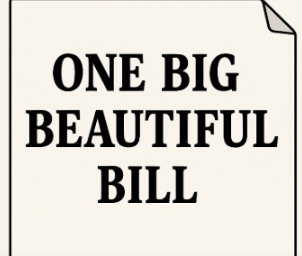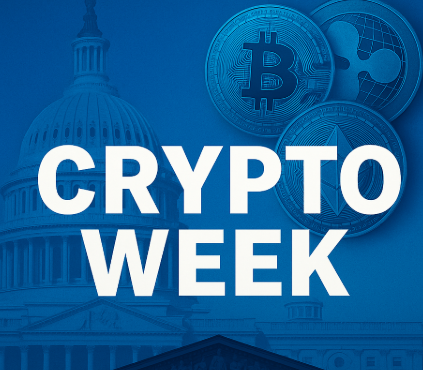The “One Big Beautiful Bill” excites conservatives but leaves openings Democrats are eager to exploit.
What to Know:
- GOP’s “One Big Beautiful Bill” (OBBB) links Medicaid and SNAP reforms with tax cuts on Social Security, overtime, and tips.
- Core Republican voters support the bill as a crackdown on waste, fraud, and abuse.
- Democrats are framing OBBB as healthcare cuts, citing up to $900 billion in reductions over a decade.
- Immigration provisions resonate with Republicans but raise concerns about wrongful targeting.
- Messaging gaffes, such as broadsides against "able-bodied young men in basements," could alienate swing voters.
Republicans have put Medicaid reform at the center of their domestic agenda with what they are calling the “One Big Beautiful Bill.” The package blends work requirements and eligibility checks for Medicaid and SNAP with tax cuts on Social Security, overtime, and tips.

Screenshot from EyesOver
The GOP's new bill is driven by conservative principles of fiscal responsibility and aims to combat government inefficiency, energizing their base. It also includes tax relief to increase take-home pay for working families, securing strong Republican support through both ideological and practical appeals.
Where Republicans Are Strong
EyesOver data shows that Republicans have a strong message when they emphasize the direct financial benefits of the “One Big Beautiful Bill.” Tax cuts on Social Security benefits, overtime pay, and tips connect easily to working Americans who want more money in their pockets.
By framing these provisions as rewards for “deserving citizens,” Republicans turn abstract entitlement reform into something tangible and personal. These simple, paycheck-focused policies give the GOP clear talking points that resonate beyond the base.

Data from EyesOver
The prosperity narrative gains even more traction when linked to border security and state-level examples. Pointing to California’s fiscal struggles, Republicans argue that Medicaid has been strained by policies that extend benefits to illegal migrants.
Positioning OBBB as a way to protect citizens first reinforces the America First brand and keeps immigration at the forefront, where Republicans consistently hold an advantage. This combination of economic relief and border protection remains the party’s most compelling ground.
Where the Bill Backfires
EyesOver shows that the same reforms energizing conservatives also create sharp vulnerabilities. Democrats are hammering OBBB as a $900 billion raid on Medicaid and SNAP, tying it to fears of hospital closures, higher costs for seniors, and lost coverage for children and people with disabilities.
That framing resonates in suburbs and swing districts where healthcare worries dominate local politics. Messaging that portrays Medicaid reform as punishing the vulnerable gives Democrats a potent way to turn the GOP’s signature bill into a liability.

Screenshot from EyesOver
Tax policy compounds the challenge. While Republicans highlight cuts on Social Security, overtime, and tips, critics point to the broader extensions of Trump-era tax cuts as handouts for billionaires and corporations.
The prosperity pitch weakens when the focus shifts to elite benefits instead of working-class relief. Concerns about rising national debt add another layer of skepticism, making fiscal conservatives uneasy and leaving Republicans open to charges that OBBB favors the wealthy while risking long-term stability.
Messaging Mistakes Republicans Must Avoid
The snapshot underscores how tone matters as much as policy. Lines about “able-bodied young men in basements” may fire up a rally crowd, but they reinforce Democratic caricatures of Republicans as out of touch and condescending. Worse, they alienate younger voters at a time when GOP support among men under 30 is fragile.

Screenshot from EyesOver
Instead, Republicans find stronger ground in framing work requirements as a matter of fairness and responsible stewardship of public funds. This approach resonates with voters who believe in protecting benefits for those who have contributed to the system through their labor and taxes, while simultaneously preventing abuse and misuse of resources.
Messages that focus on prosperity and fairness are more effective and appealing than those that appear punitive or judgmental. This is the fundamental lesson.
How Democrats Can Exploit the Moment
Democrats see their clearest path by tying OBBB to healthcare cuts. For suburban moderates and seniors, the prospect of losing coverage is a more immediate motivator than tax relief on tips. Democrats will emphasize the $900 billion figure in every district where healthcare costs dominate local politics.
Immigration provisions also present an opportunity. By raising fears of wrongful targeting and bureaucratic overreach, Democrats can frame the bill as both cruel and incompetent. For a party struggling to rebuild enthusiasm, Medicaid offers a tangible way to contrast Republican cuts with Democratic promises of stability.
Wrap Up
More than just a legislative debate, the “One Big Beautiful Bill” represents a crucial test of which party can effectively shape the narrative of prosperity and security as the country approaches 2026. For Republicans, the task is to sharpen their message around working-class tax relief and protection for citizens while avoiding rhetoric that fuels Democratic attacks. For Democrats, the opportunity is to brand OBBB as a healthcare cut disguised as reform, rallying suburban voters and seniors who fear losing benefits.
The stakes are significant. If Republicans succeed, they will cement Medicaid reform as a winning wedge issue that ties together tax relief, border security, and entitlement fairness. If Democrats can keep the focus on healthcare cuts and corporate giveaways, they may blunt the GOP’s advantage and build their own coalition around economic security. Either way, the outcome of this messaging battle will shape the midterm landscape and set the stage for 2028.





